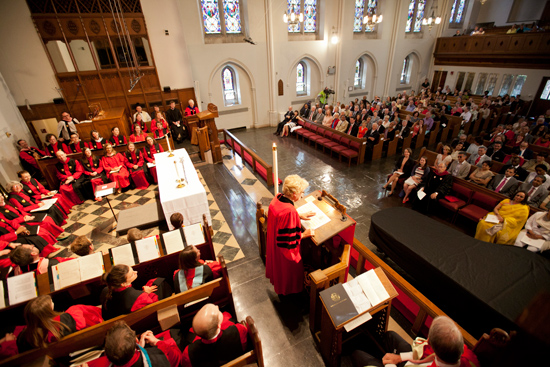Work Together to Complete a “Social Revolution,” Says Baccalaureate Speaker
MIT’s Hopkins tells packed Marsh Chapel crowd to strive for equal opportunity, justice
Molecular biologist Nancy Hopkins, the Amgen, Inc., Professor of Biology at the Massachusetts Institute of Technology, recalled personal trials as a female scientist and challenged graduates to overcome invisible barriers in an inspiring Baccalaureate Address to the Class of 2014 at Marsh Chapel Sunday morning.
She mentioned some of the great breakthroughs of the last 50 years: the internet, the Higgs particle, and notably, the “discovery of unconscious biases and the extent to which stereotypes about gender, race, sexual orientation, socioeconomic status, and age deprive people of equal opportunity in the workplace and equal justice in society.”
Hopkins was later awarded an honorary Doctor of Science at BU’s 141st Commencement.
She spoke before a packed audience at Marsh Chapel and was enthusiastically applauded for her remarks. President Robert A. Brown, University Provost Jean Morrison, Marsh Chapel Dean Robert Hill, and Emma Rehard (CAS’14) also addressed the graduates and their families. Scott Allen Jarrett (CFA’99,’08), director of music at Marsh Chapel, led the Marsh Chapel Choir in “Clarissima” and “For the Beauty of the Earth.”
Early in her career, Hopkins worked in the lab of James Watson, the codiscoverer of the structure of DNA. She earned a PhD at Harvard and became a faculty member at MIT, working at the Center for Cancer Research. There, she focused her research on RNA tumor viruses, then considered to be a likely cause for many cancers in humans. Hopkins also studied developmental genetics in zebra fish, and helped to design the first successful method for making insertional mutagenesis work in a vertebrate model. That accomplishment enabled her team to identify genes essential for zebra fish development, with implications for better understanding development in other species.
While advancing science in the lab, Hopkins was discouraged by some of the systemic problems she observed in academic research. “When a man and a woman made discoveries of equal scientific importance,” she told the Baccalaureate audience, “the man and his discovery were valued more highly than the woman and her discovery.”

Hopkins cited research by psychologists “who documented the irrationality of our brains, and our inability to make accurate judgments of even simple numerical facts if the conclusions contradict our unconscious biases.
“You can demonstrate gender bias,” she said, “simply by making copies of a research article, putting a man’s name on half the copies and a woman’s on the other half, and sending the two versions out for review: reviewers judge the identical work to be better if they believe it was done by a man. Surprisingly, it doesn’t matter if the reviewers are men or women.”
For years, Hopkins said, she avoided calling attention to the problem, for fear of being accused of whining. Then on a whim, in 1994 she measured all of the labs in her building at MIT and found that female scientists had less lab space than male colleagues. She needed more quantitative data and discovered that only 8 percent of MIT’s science faculty were women (Harvard and BU had similar statistics). At MIT, her findings led to a university-wide examination of possible gender bias against women scientists.
“We learned that the unconscious undervaluation of women’s work can cause women of equal accomplishment not to be hired, and cause women who are hired to receive fewer resources for their research,” she said. “The women were marginalized. No wonder there were still so few women science professors 20 years ago. More amazing was that the ones who were there were so successful.”
When the results were published in 1999, Hopkins started receiving emails from women around the world writing that they had experienced the same problems. Hopkins was named cochair, along with BU President Robert A. Brown, then MIT provost, of MIT’s first Council on Faculty Diversity. MIT went on to write new family leave policies, and in 2001, the school’s new computer science building was designed to include a large day-care center. Today, many junior women faculty at MIT have children, proving they can be both scientists and mothers, said Hopkins, who famously walked out of a 2005 speech by Lawrence Summers, then president of Harvard, when he suggested that “intrinsic aptitude” might explain why there were relatively few high-achieving women in engineering fields.
In her parting words, Hopkins told the graduates that while they should first care about finding work they love, men and women must work together to complete a social revolution.
“If you look around and see that the people you work or study with all look like you, you’ll know something’s wrong, and work to change it,” she said. “Completing this revolution won’t happen by the passage of time, but because you make it happen.”

Comments & Discussion
Boston University moderates comments to facilitate an informed, substantive, civil conversation. Abusive, profane, self-promotional, misleading, incoherent or off-topic comments will be rejected. Moderators are staffed during regular business hours (EST) and can only accept comments written in English. Statistics or facts must include a citation or a link to the citation.